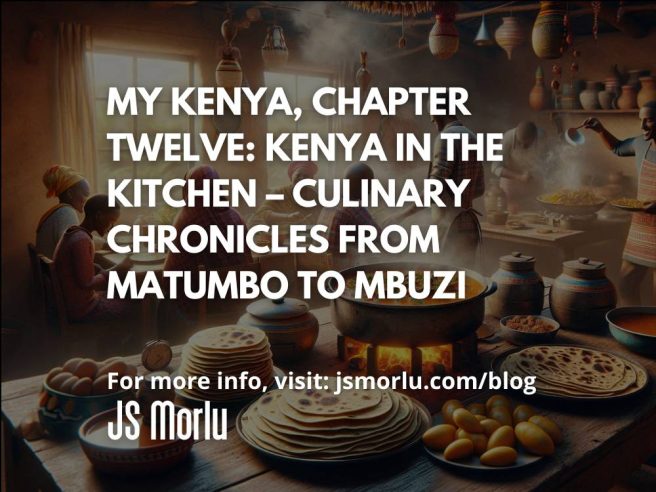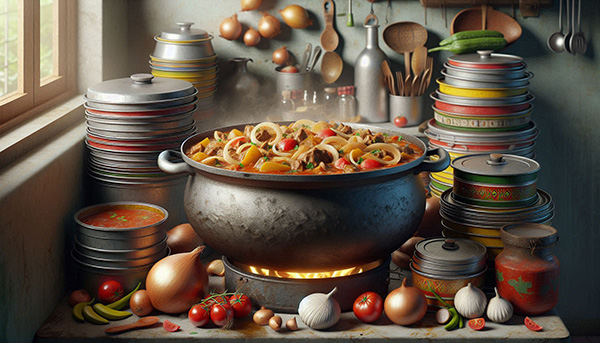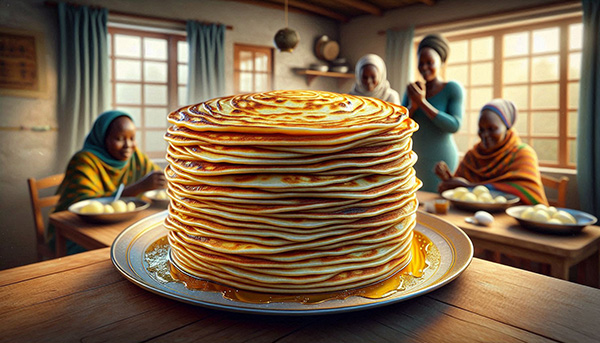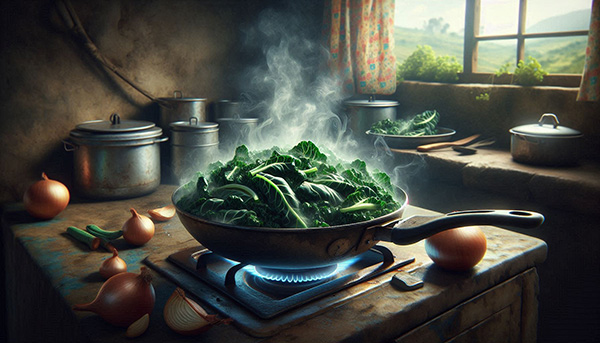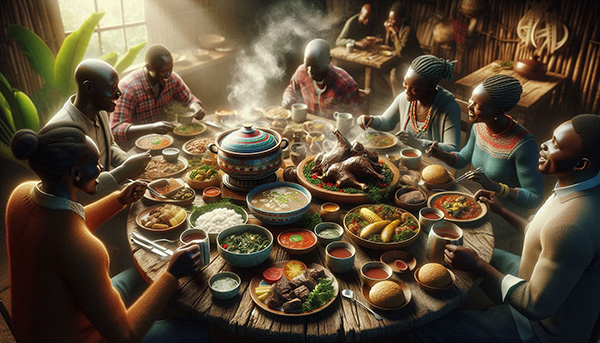By: John S. Morlu II, CPA
If you want to understand a people, don’t read their history. Eat their food.
And in Kenya, food is not just survival — it’s soul, strategy, and sometimes a subtle competition between aunties.
The average Kenyan meal comes with carbs, meat, and unsolicited life advice. If you’re lucky, it also includes a debate about the best chapati thickness and how soft ugali should be before you’re accused of being “too Western.”
Matumbo: The Undisputed Champion of Controversy
Matumbo (tripe) is the liver of relationships. It’ll separate the loyal from the fake. You either love it, or you pretend to love it so your in-laws don’t judge you.
Chewy, textured, and often smothered in a stew of onions and tomatoes, matumbo smells like struggle and tastes like tradition. It’s also what your favorite boda boda rider eats before telling you politics at 6:30am.
Fun fact: No Kenyan has ever made a small amount of matumbo. It’s always in a giant pot, capable of feeding the entire village, three visitors you didn’t invite, and that one uncle who never leaves.
Also, leftover matumbo never fits in one container. You’ll find it mysteriously divided into four mismatched tubs, one of which is clearly labeled “Blue Band.”
Mbuzi: The Party Animal
Mbuzi (goat meat) is Kenya’s official party ambassador. Got a graduation? Mbuzi. A dowry ceremony? Mbuzi. You just bought a new phone? Still mbuzi.
Whether it’s wet fry, dry fry, or roasted with salt and conspiracy theories, goat meat brings people together.
And no Kenyan mbuzi story is complete without a story of betrayal:
“I told him bring 2 kilos, he brought 1 and disappeared with change.”
Also — you haven’t lived until you’ve been assigned “mbuzi duty,” where your only job is to flip meat, avoid overcooking, and look busy so no one sends you for more onions.
Chapati: The Gold Standard
If your chapati doesn’t have visible layers and enough oil to reflect your insecurities, don’t serve it. It’s a sign of love — and competition.
Aunties will judge each other’s chapati thickness the way NASA judges rocket insulation. “Too thin,” “Too thick,” or “Who taught you this?”
Chapati is also the one dish that turns kitchen visitors into overnight chefs. Everyone suddenly has an opinion. But when you ask for help kneading? Silence.
🧱 Bonus Fact: In some homes, chapatis are hidden in locked drawers. Yes — hidden like family secrets.
Githeri: Boarding School Nostalgia
Githeri (a mix of beans and maize) is the food that made or broke many childhoods. Some people still have flashbacks.
It’s hearty, honest, and was often served in boarding school with the consistency of gravel. If your spoon broke in the githeri, you just adjusted and used the sharp end.
But done right — with butter, garlic, and onions — githeri slaps harder than your auntie when you lie about washing dishes.
Sukuma Wiki: Stretch That Salary
Sukuma wiki (collard greens) literally means “to push the week.” It’s the most hardworking vegetable in the country. Economists should include it in GDP.
Sukuma wiki has carried entire households through rent deadlines, job losses, and broken hearts. It’s proof that with enough onions and oil, you can stretch hope and hunger for five days.
Fun Facts:
- Every Kenyan household has a secret spice mix — guarded like Bitcoin passwords and only shared on deathbeds.
- Salt is measured by ancestors, not teaspoons. “Just feel it with your spirit.”
- Tea is considered medicine, therapy, and a cure for everything from heartbreak to job loss.
- There’s always one cousin who eats like it’s their last meal. It’s always the quiet one.
- Some families still reuse margarine containers for stew — even if it leaks. That’s tradition.
Final Taste
Kenyan food is more than nourishment. It’s identity, history, celebration, and emotional support.
It’s the sizzle of nyama choma, the comfort of sukuma wiki, the audacity of ugali, and the divine healing powers of tea brewed in a sufuria with zero measurements.
So next time you’re in Kenya, eat slowly. Ask questions. Take second helpings. Then politely decline the third, because there will be one.
Next up in Chapter Thirteen:
“Cash, Credit & Chamas – The Wild World of Kenyan Money Moves.”
About the Author
John is an entrepreneur, strategist, and founder of JS Morlu, LLC, a Virginia based CPA firm with multiple software ventures including www.FinovatePro.com, www.Recksoft.com and www.Fixaars.com . With operations spanning multiple countries, John is on a mission to build global infrastructure that empowers small businesses, entrepreneurs, and professionals to thrive in an increasingly competitive world. He believes in hard truths, smart execution, and the relentless pursuit of excellence. When he’s not writing or building, he’s challenging someone to a productivity contest—or inventing software that automates it.
JS Morlu LLC is a top-tier accounting firm based in Woodbridge, Virginia, with a team of highly experienced and qualified CPAs and business advisors. We are dedicated to providing comprehensive accounting, tax, and business advisory services to clients throughout the Washington, D.C. Metro Area and the surrounding regions. With over a decade of experience, we have cultivated a deep understanding of our clients’ needs and aspirations. We recognize that our clients seek more than just value-added accounting services; they seek a trusted partner who can guide them towards achieving their business goals and personal financial well-being.
Talk to us || What our clients says about us

